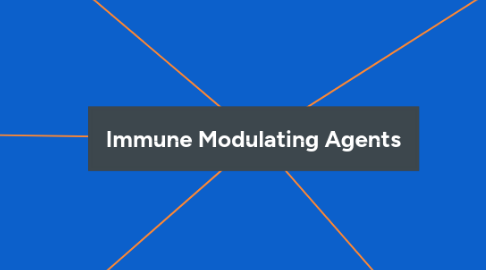
1. Immune Suppressants
1.1. Antibodies - Example - names vary based on particular Lymphocytic targets
1.1.1. Indications:
1.1.1.1. Transplant Rejection
1.1.1.1.1. Bone Marrow; Other organ transplants
1.1.1.2. Diseases with Autoimmune Response
1.1.1.2.1. Idiopathic Thrombocytic Purpura
1.1.1.2.2. Other hemolytic disorders
1.2. Azathioprine
1.2.1. Indications:
1.2.1.1. Transplant Rejection
1.2.1.1.1. Kidney, Heart, Liver, Pancreas
1.2.1.2. Diseases with Autoimmune Response
1.2.1.2.1. Rheumatoid arthritis, Inflammatory Bowel disease (IBD), Myasthenia gravis, SLE, Others
1.3. Cyclophosphamide
1.3.1. Indications:
1.3.1.1. Transplant Rejection
1.3.1.1.1. Bone Marrow; Other organ transplants
1.3.1.2. Diseases with Autoimmune Response
1.3.1.2.1. Rheumatoid arthritis, Multiple Sclerosis (MS), Myasthenia gravis, SLE, Others
1.4. Cyclosporine
1.4.1. Indications:
1.4.1.1. Transplant Rejection
1.4.1.2. Diseases with Autoimmune Response
1.5. Sirolimus
1.5.1. Indications:
1.5.1.1. Transplant Rejection
1.5.1.2. Diseases with Autoimmune Response
1.6. Everolimus
1.6.1. Indications:
1.6.1.1. Transplant Rejection
1.6.1.2. Diseases with Autoimmune Response
1.7. Glucocorticoids
1.7.1. Indications:
1.7.1.1. Transplant Rejection
1.7.1.2. Diseases with Autoimmune Response
1.8. Methotrexate
1.8.1. Indications:
1.8.1.1. Transplant Rejection
1.8.1.2. Diseases with Autoimmune Response
1.9. Mycophenolate mofetil
1.9.1. Indications:
1.9.1.1. Transplant Rejection
1.9.1.2. Diseases with Autoimmune Response
1.9.2. Indications:
1.9.2.1. Transplant Rejection
1.9.2.2. Diseases with Autoimmune Response
1.10. Tacrolimus
1.10.1. Indications:
1.10.1.1. Transplant Rejection
1.10.1.2. Diseases with Autoimmune Response
1.11. Sulfasalazine
1.11.1. Indications:
1.11.1.1. Transplant Rejection
1.11.1.2. Diseases with Autoimmune Response
1.12. Temsirolimus
1.12.1. Indications:
1.12.1.1. Transplant Rejection
1.12.1.2. Diseases with Autoimmune Response
2. Immune Stimulants
2.1. Bacille Calmette-Guérin
2.2. Immune Globulins
2.3. Cytokines
2.4. Vaccines
3. Side Effects of Suppressants
3.1. Azathioprine
3.1.1. Suppression of bone marrow
3.1.1.1. leukopenia
3.1.1.2. megaloblastic anemia
3.2. Cyclosphosphamide
3.2.1. Carcinogenic w/LT use
3.2.2. Hematologic Disorders (leukopenia, others)
3.3. Calcineurin Inhibitors
3.3.1. Nephrotoxicity
3.3.2. Hypertension
3.3.3. Neurotoxicity
3.3.4. Hirsutism
3.3.5. Infection risks
3.3.6. Others
3.4. Glucocorticoids
3.4.1. Catabolic effect on collagenous tissues
3.4.2. Enhances breakdown of muscle, bone, skin, and other tissues
3.4.3. Severe weakness
3.4.4. Hyperglycemia
3.4.5. Adrenal suppression
3.4.6. Growth retardation, Increased infection risk
3.4.7. Glaucoma
3.4.8. Gastric ulcers
3.4.9. Others…
3.5. Methotrexate (dose-related - i.e. higher the dose, more ADRs)
3.5.1. Hepatic toxicity
3.5.2. Pulmonary Toxicity
3.6. Mycophenolate mofetil
3.6.1. Blood disorders
3.6.2. Anemia, Leukopenia, Neutropenia
3.6.3. GI problems
3.6.4. Muscle pain / Weakness
3.6.5. Cardiovascular – HTN, Arrhythmias
3.7. Sulfasalazine
3.7.1. Headache
3.7.2. Blood dyscrasias
3.7.3. Hypersensitivity to UV light
3.7.4. Hypersensitivity reactions – can be severe and cause death
3.8. mTOR inhibitors
3.8.1. Blood lipid disorders
3.8.1.1. Hypercholesterolemia
3.8.1.2. Hypertriglyceridemia
3.8.2. Impairs wound healing;
3.8.3. Blood disorders:
3.8.3.1. Anemia
3.8.3.2. Leukopenia
3.8.3.3. Thrombocytopenia
3.8.4. Joint & muscle pain
3.8.5. Hypertension
3.8.6. Others…
3.9. Calcineurin Inhibitors (Tacrolimus)
3.9.1. GI disturbances (cramps, nausea, diarrhea, constipation)
3.9.2. Weakness
3.9.3. Fever
3.9.4. Skin rashes
3.9.5. RENAL & CNS toxicities
3.9.6. Hyperglycemia – can cause DM in some
4. Side-effect of Stimulants
4.1. Hyper-immune Reactions
4.2. Cytokine Storms
5. Relevance to Physical Therapy
5.1. See the MSK Side-effects of Suppressants
5.1.1. Glucocorticoids & other suppressants can cause multiple MSK related complications including intense weakness that can impair exercise and has deleterious effects on collagenous tissue
5.1.1.1. Rigorous exercise but there are guidelines to such exercise in steroid-induced weakness
5.1.2. Infections can occur with suppressants
5.1.2.1. Strict infection control
5.1.3. Hematologic complications can impair oxygen carrying capacity and that will be limiter to exercise
5.1.3.1. May not be able to exercise if Hemoglobin is very low
5.1.4. General unwellness from toxicity of some of the drugs will hinder ability to participate in exercise
5.2. Immune Stimulants can allow the immune system to go berserk
5.2.1. Hyperimmune reactions & cytokine storms may cause any type of immune response that can be life-threatening - see various autoimmune disorders caused by drug reactions
